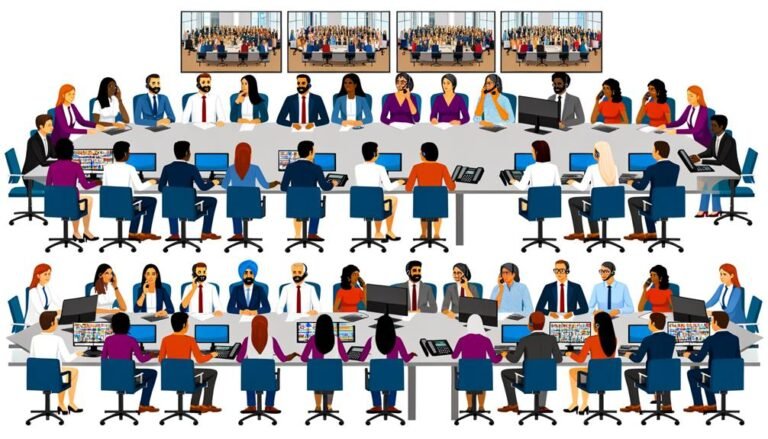Basic Customer Service Skills
|
Getting your Trinity Audio player ready...
|
In the world of business, customer service is often the first point of contact between a company and its customers. Basic customer service skills are essential for creating positive experiences and fostering long-term relationships.
From effective communication to problem-solving, these skills are crucial for not only meeting but exceeding customer expectations. Understanding and mastering these skills can significantly impact customer satisfaction and loyalty.
Key Takeaways
- Effective communication is essential for understanding and resolving customer needs and concerns.
- Active listening is crucial for navigating conflicts and finding solutions, as it helps to understand customer tone, body language, and emotions.
- Problem-solving skills are necessary for efficiently addressing and resolving customer issues, including steps such as identifying the problem, gathering relevant information, brainstorming solutions, evaluating options, and implementing the best solution.
- Empathy and patience are important for building rapport and fostering positive interactions, including actively listening, acknowledging feelings, and responding compassionately to customers.
Effective Communication
Effective communication is essential in providing exceptional customer service, as it allows for clear understanding and resolution of customer needs and concerns. One crucial aspect of effective communication in customer service is conflict resolution. Customer service representatives must possess the ability to navigate conflicts and find solutions that satisfy the customer while aligning with the company's policies. This requires active listening, empathy, and the ability to remain calm and composed in challenging situations.
Verbal and nonverbal cues play a significant role in communication. Verbal cues involve the words and tone used during interactions with customers. It is important to choose words carefully and maintain a respectful and professional tone. Nonverbal cues, such as body language and facial expressions, also convey important messages. Customer service professionals should be mindful of their nonverbal cues to ensure they are conveying attentiveness and openness.
Furthermore, effective communication involves the skill of clearly articulating solutions and information to customers. Customer service representatives should be able to convey complex information in a simple and understandable manner, ensuring that customers are well-informed and satisfied with the interaction.
Active Listening
Navigating conflicts and finding solutions require the customer service representatives to actively engage in the skill of active listening. Effective communication techniques and listening skills are essential components of active listening. Customer feedback is a valuable source of information, and by actively listening to their concerns, customer service representatives can gain a deeper understanding of their needs. This enables them to provide more personalized and effective solutions.
Active listening involves not only hearing what the customer is saying but also paying attention to their tone, body language, and emotions. By doing so, customer service representatives can pick up on underlying issues that may not be explicitly stated. This allows for a more empathetic and comprehensive response to the customer's needs.
Additionally, active listening fosters a sense of trust and understanding, ultimately leading to improved customer satisfaction and loyalty.
Problem-Solving

Utilizing effective problem-solving techniques is crucial for customer service representatives to address and resolve customer issues efficiently and satisfactorily. Critical thinking and decision-making skills play a vital role in resolving customer problems effectively. When faced with a customer complaint or issue, representatives need to analyze the situation, evaluate possible solutions, and make informed decisions to reach a resolution. Here's a table outlining key problem-solving techniques:
| Problem-Solving Techniques | Description |
|---|---|
| Identify the problem | Clearly define the issue at hand. |
| Gather relevant information | Collect all necessary data related to the problem. |
| Brainstorm solutions | Generate possible ways to address the problem. |
| Evaluate options | Assess the potential outcomes of each solution. |
| Implement the best solution | Take action based on the chosen course of action. |
Empathy and Patience
When addressing customer issues, demonstrating empathy and patience is essential for building rapport and fostering positive interactions. Empathy training plays a crucial role in helping customer service representatives understand and relate to the emotions and experiences of the customers they are assisting. This training equips them with the ability to listen actively, acknowledge the customer's feelings, and respond in a compassionate manner. By demonstrating genuine empathy, customer service professionals can create a sense of understanding and trust, which is fundamental for customer satisfaction and loyalty.
In addition to empathy, practicing patience is equally important in customer service. Patience exercises can help employees maintain composure and stay attentive, even in challenging situations. These exercises involve techniques for managing stress, controlling emotional reactions, and maintaining a positive attitude. Through patience exercises, customer service representatives can learn to handle difficult customers with grace and professionalism, leading to more constructive problem-solving and better outcomes.
Ultimately, by combining empathy and patience, customer service professionals can deliver exceptional support and create a positive impact on customer experiences.
Product Knowledge

Having a deep understanding of the products or services offered is crucial for providing effective and knowledgeable customer support. This knowledge empowers customer service representatives to address inquiries, provide accurate information, and offer relevant solutions. To achieve this, representatives should:
- Stay Informed about Products: Regularly updating knowledge about the company's products or services by attending training sessions and reviewing updated materials ensures that customer service representatives are well-equipped to address customer queries.
- Product Demonstration: Being able to effectively demonstrate how a product works or how a service can benefit the customer adds value to the customer experience and helps in resolving customer issues.
- Understanding Industry Trends: Keeping abreast of industry trends and developments enables representatives to offer informed insights and guidance to customers, positioning the company as a trusted source of information and expertise.
Conclusion
In conclusion, mastering basic customer service skills is essential for success in any industry.
Effective communication, active listening, problem-solving, empathy, patience, and product knowledge are crucial for providing excellent customer service.
These skills are the foundation for building strong relationships with customers and ensuring their satisfaction.
Without these skills, businesses would be lost in a sea of dissatisfied customers, leading to the downfall of even the most successful companies.







